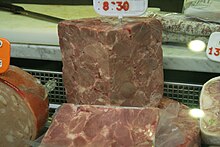brawn
See also: Brawn
English

Etymology
From Middle English brawne, from Old French braon (“slice of meat, fleshy part, buttock”), from Frankish *brādon, *brādan, accusative form of *brādō (“roasted meat, ham”), from Proto-Germanic *brēdô (“meat, roast”), of uncertain further origin, but possibly from Proto-Indo-European *bʰreh₁- (“to burn, heat”). Akin to Old High German brāto (“tender meat”) (German Braten (“roast”)), Old English brǣde, brǣd (“flesh, meat”), Old Norse bráð (“raw meat”).
Pronunciation
Noun
brawn (uncountable)
- Strong muscles or lean flesh, especially of the arm, leg or thumb.
- Physical strength; muscularity.
- The builders at the site had more brawn than brain.
- 2000, Stephanie Laurens, A Secret Love, Avon Books (2000), →ISBN, page 349:
- The man was a bruiser, the sort who'd learned his science in tavern brawls. Given his size and lack of agility, he relied on his brawn to win. In any wrestling match, Crowley would triumph easily.
- 2008, Michael Mandaville, Stealing Thunder, Dog Ear Publishing (2008), →ISBN, page 562:
- The two men were husky, picked for their brawn by the little man who sauntered into the room.
- 2010, Martin Pasko & Robert Greenberger, The Essential Superman Encyclopedia, Del Ray (2010), →ISBN, page 218:
- The youth agreed to the scheme and used his brawn to begin moving pieces into place, starting by moving the planet Rann into the Thanagarian star system […]
- (chiefly British) Head cheese; a terrine made from the head of a pig or calf; originally boar's meat.
- 1820, Percy Bysshe Shelley, Oedipus Tyrannus; Or, Swellfoot The Tyrant: A Tragedy in Two Acts:
- Now if your Majesty would have our bristles
To bind your mortar with, or fill our colons
With rich blood, or make brawn out of our gristles,
In policy—ask else your royal Solons—
You ought to give us hog-wash and clean straw,
And sties well thatched; besides it is the law!
- Now if your Majesty would have our bristles
- 1978, Jane Gardam, God on the Rocks, Abacus 2014, p. 111:
- It was brawn and shape for high tea.
- 1820, Percy Bysshe Shelley, Oedipus Tyrannus; Or, Swellfoot The Tyrant: A Tragedy in Two Acts:
- (UK, dialectal) A boar.
- 1821, John Stagg, The Cumbrian Minstrel: Being a Poetical Miscellany:
- And loud as brawns wer [they] snoring,
- 1842, Moses Aaron Richardson, The Borderer's Table Book: Or, Gatherings of the Local History:
- THE village of Brancepath, pleasantly situated at the distance of four miles and three- quarters south-west by west of Durham, is said to have derived its name (a corruption of Brawn's-path) from a brawn of vast size, [...]
- 1821, John Stagg, The Cumbrian Minstrel: Being a Poetical Miscellany:
Derived terms
Translations
strong muscles
|
physical strength, muscularity
|
terrine
|
See also
Verb
brawn (third-person singular simple present brawns, present participle brawning, simple past and past participle brawned)
- (transitive) Make fat, especially of a boar.
- (intransitive) Become fat, especially of a boar.
Derived terms
Translations
to make fat
|
to become fat
|
Middle English
Noun
brawn
- Alternative form of brawne
Categories:
- English terms derived from Proto-Indo-European
- English terms derived from the Proto-Indo-European root *bʰreh₁-
- English terms inherited from Middle English
- English terms derived from Middle English
- English terms derived from Old French
- English terms derived from Frankish
- English terms derived from Proto-Germanic
- English 1-syllable words
- English terms with IPA pronunciation
- Rhymes:English/ɔːn
- Rhymes:English/ɔːn/1 syllable
- English terms with audio pronunciation
- English lemmas
- English nouns
- English uncountable nouns
- English terms with usage examples
- British English
- English dialectal terms
- English verbs
- English transitive verbs
- English intransitive verbs
- Middle English lemmas
- Middle English nouns